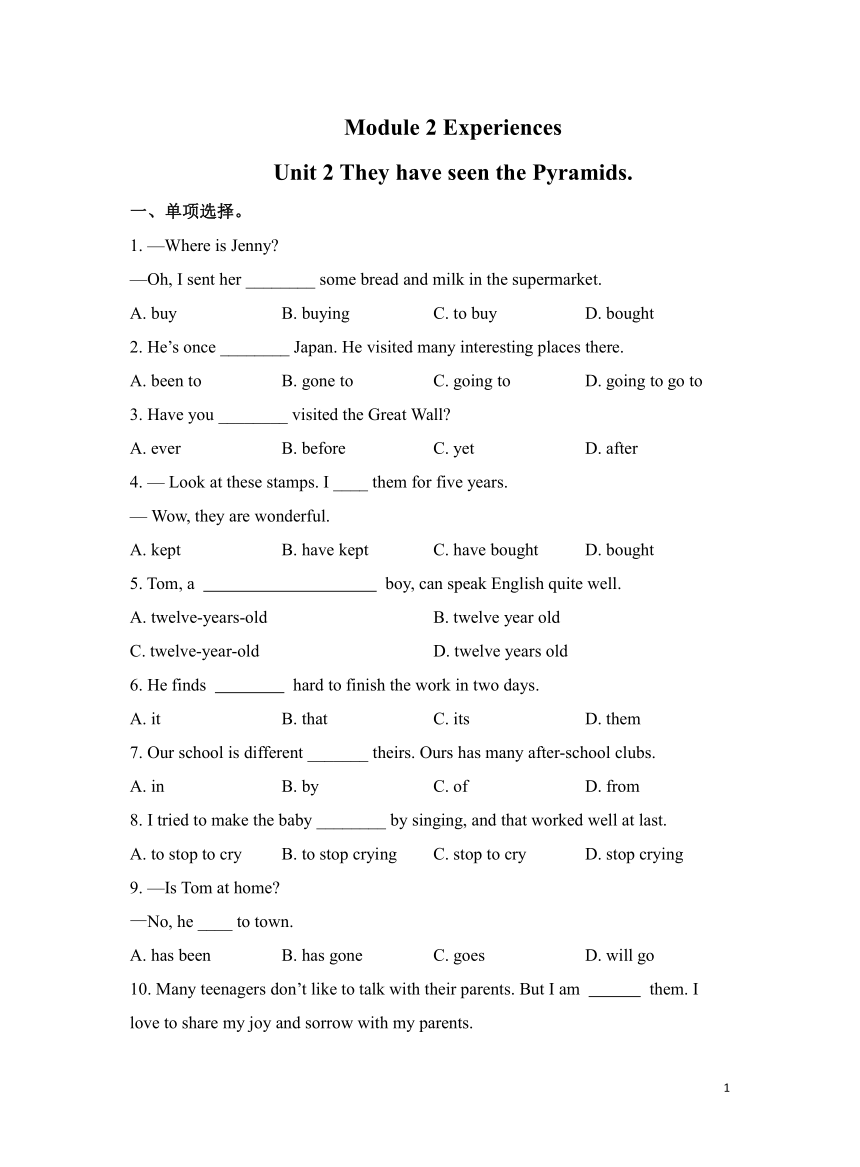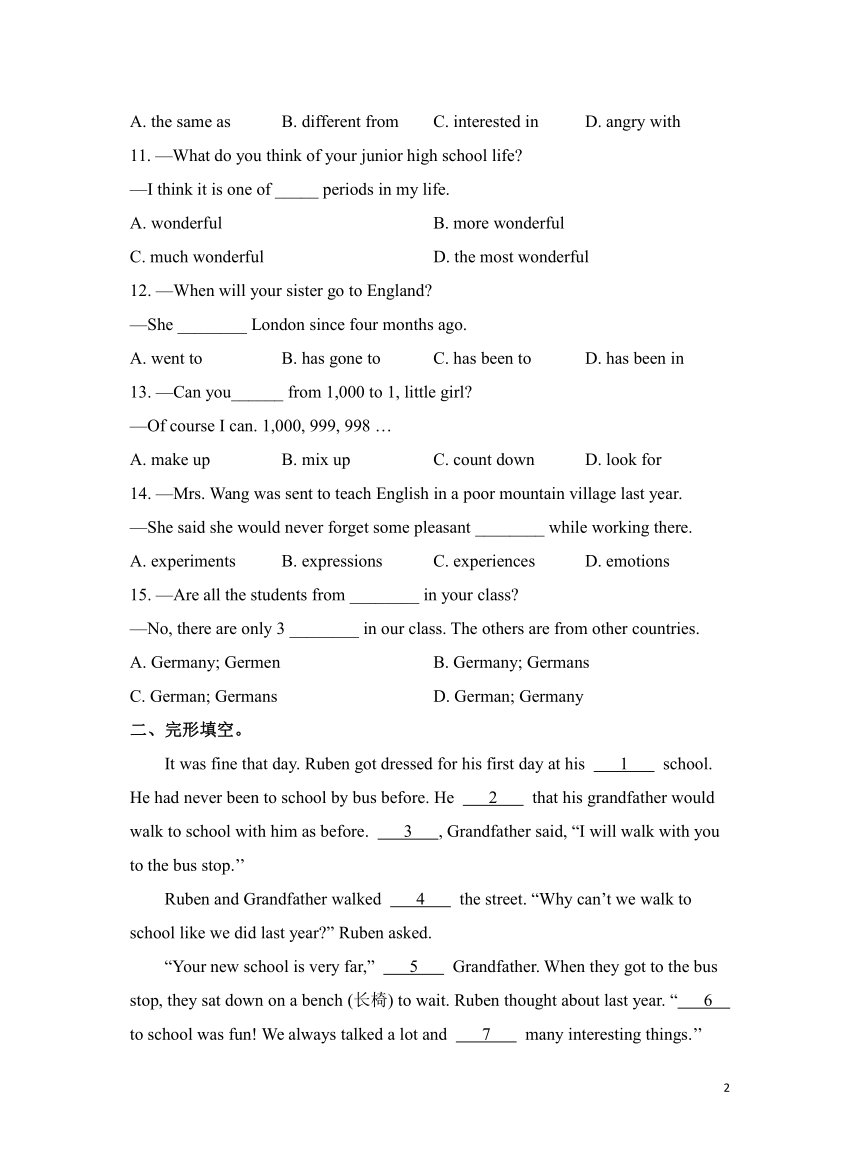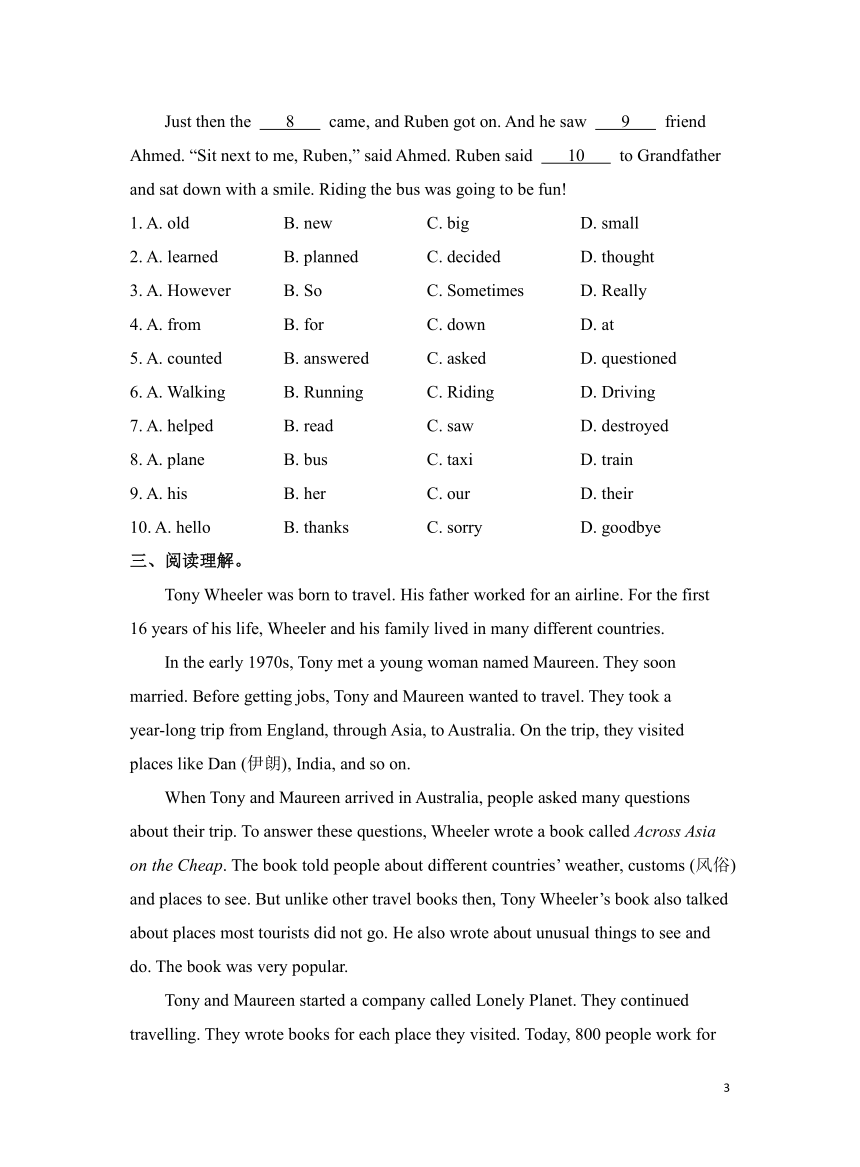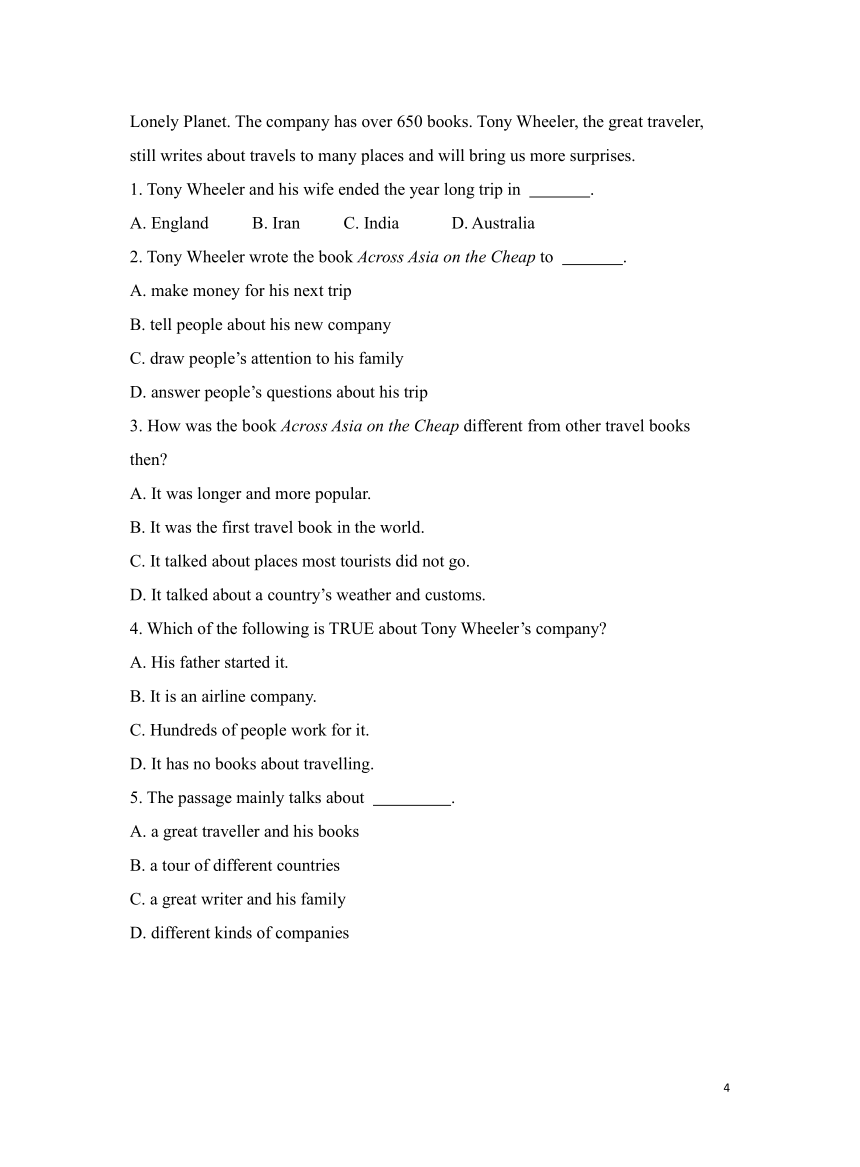初中英语外研版八下Module 2 Experiences Unit 2作业(含解析)
文档属性
| 名称 | 初中英语外研版八下Module 2 Experiences Unit 2作业(含解析) |  | |
| 格式 | doc | ||
| 文件大小 | 73.5KB | ||
| 资源类型 | 教案 | ||
| 版本资源 | 外研版 | ||
| 科目 | 英语 | ||
| 更新时间 | 2023-08-30 16:58:23 | ||
图片预览




文档简介
Module 2 Experiences
Unit 2 They have seen the Pyramids.
一、单项选择。
1. —Where is Jenny
—Oh, I sent her ________ some bread and milk in the supermarket.
A. buy B. buying C. to buy D. bought
2. He’s once ________ Japan. He visited many interesting places there.
A. been to B. gone to C. going to D. going to go to
3. Have you ________ visited the Great Wall
A. ever B. before C. yet D. after
4. — Look at these stamps. I ____ them for five years.
— Wow, they are wonderful.
A. kept B. have kept C. have bought D. bought
5. Tom, a boy, can speak English quite well.
A. twelve-years-old B. twelve year old
C. twelve-year-old D. twelve years old
6. He finds hard to finish the work in two days.
A. it B. that C. its D. them
7. Our school is different _______ theirs. Ours has many after-school clubs.
A. in B. by C. of D. from
8. I tried to make the baby ________ by singing, and that worked well at last.
A. to stop to cry B. to stop crying C. stop to cry D. stop crying
9. —Is Tom at home
—No, he ____ to town.
A. has been B. has gone C. goes D. will go
10. Many teenagers don’t like to talk with their parents. But I am them. I love to share my joy and sorrow with my parents.
A. the same as B. different from C. interested in D. angry with
11. —What do you think of your junior high school life
—I think it is one of _____ periods in my life.
A. wonderful B. more wonderful
C. much wonderful D. the most wonderful
12. —When will your sister go to England
—She ________ London since four months ago.
A. went to B. has gone to C. has been to D. has been in
13. —Can you______ from 1,000 to 1, little girl
—Of course I can. 1,000, 999, 998 …
A. make up B. mix up C. count down D. look for
14. —Mrs. Wang was sent to teach English in a poor mountain village last year.
—She said she would never forget some pleasant ________ while working there.
A. experiments B. expressions C. experiences D. emotions
15. —Are all the students from ________ in your class
—No, there are only 3 ________ in our class. The others are from other countries.
A. Germany; Germen B. Germany; Germans
C. German; Germans D. German; Germany
二、完形填空。
It was fine that day. Ruben got dressed for his first day at his 1 school. He had never been to school by bus before. He 2 that his grandfather would walk to school with him as before. 3 , Grandfather said, “I will walk with you to the bus stop.’’
Ruben and Grandfather walked 4 the street. “Why can’t we walk to school like we did last year ” Ruben asked.
“Your new school is very far,” 5 Grandfather. When they got to the bus stop, they sat down on a bench (长椅) to wait. Ruben thought about last year. “ 6 to school was fun! We always talked a lot and 7 many interesting things.’’
Just then the 8 came, and Ruben got on. And he saw 9 friend Ahmed. “Sit next to me, Ruben,” said Ahmed. Ruben said 10 to Grandfather and sat down with a smile. Riding the bus was going to be fun!
1. A. old B. new C. big D. small
2. A. learned B. planned C. decided D. thought
3. A. However B. So C. Sometimes D. Really
4. A. from B. for C. down D. at
5. A. counted B. answered C. asked D. questioned
6. A. Walking B. Running C. Riding D. Driving
7. A. helped B. read C. saw D. destroyed
8. A. plane B. bus C. taxi D. train
9. A. his B. her C. our D. their
10. A. hello B. thanks C. sorry D. goodbye
三、阅读理解。
Tony Wheeler was born to travel. His father worked for an airline. For the first 16 years of his life, Wheeler and his family lived in many different countries.
In the early 1970s, Tony met a young woman named Maureen. They soon married. Before getting jobs, Tony and Maureen wanted to travel. They took a year-long trip from England, through Asia, to Australia. On the trip, they visited places like Dan (伊朗), India, and so on.
When Tony and Maureen arrived in Australia, people asked many questions about their trip. To answer these questions, Wheeler wrote a book called Across Asia on the Cheap. The book told people about different countries’ weather, customs (风俗) and places to see. But unlike other travel books then, Tony Wheeler’s book also talked about places most tourists did not go. He also wrote about unusual things to see and do. The book was very popular.
Tony and Maureen started a company called Lonely Planet. They continued travelling. They wrote books for each place they visited. Today, 800 people work for Lonely Planet. The company has over 650 books. Tony Wheeler, the great traveler, still writes about travels to many places and will bring us more surprises.
1. Tony Wheeler and his wife ended the year long trip in .
A. England B. Iran C. India D. Australia
2. Tony Wheeler wrote the book Across Asia on the Cheap to .
A. make money for his next trip
B. tell people about his new company
C. draw people’s attention to his family
D. answer people’s questions about his trip
3. How was the book Across Asia on the Cheap different from other travel books then
A. It was longer and more popular.
B. It was the first travel book in the world.
C. It talked about places most tourists did not go.
D. It talked about a country’s weather and customs.
4. Which of the following is TRUE about Tony Wheeler’s company
A. His father started it.
B. It is an airline company.
C. Hundreds of people work for it.
D. It has no books about travelling.
5. The passage mainly talks about .
A. a great traveller and his books
B. a tour of different countries
C. a great writer and his family
D. different kinds of companies
参考答案与解析
一、单项选择。
1. C
【解析】句意:“詹妮在哪儿?”“哦,我安排她去超市买一些面包和牛奶了。”send sb. to do sth.派遣某人做某事,固定搭配。故选C。
2. A
【解析】句意:他曾去过日本。他参观了那里许多有趣的地方。根据“once”及“He visited many interesting places there”可知此处用现在完成时;have/has been to表示“(某人)曾经去过某地”;have/has gone to表示“(某人)现在到某地去了(现在不在这儿了)”;根据“visited many interesting places”可知是去过,回来了,故选A。
3. A
【解析】句意:你参观过长城吗 ever曾经(用于否定句和疑问句,放句中);before在……之前;yet还(用于否定句和疑问句,放句末);after在……之后;根据“Have you ________ visited”可知此处是现在完成时的疑问句形式,且位于句中,所以用“ever”,故选A。
4. B
【解析】根据for three years可知本句用现在完成时。动词应是延续性动词,故选B。
5. C
【解析】句意:汤姆,一个12岁的男孩,说英语说的非常好。数词+名词+形容词,当中间有连字符时,表示是……的,相当于形容词,名词不用复数,所以排除A,当没连字符时,因为是twelve,所以要用years,表示是 12岁,所以排除B;这里需要形容词修饰名词boy,故选C。
6. A
【解析】 sb. finds it +adj.+ to do sth. “某人发现做某事怎么样”,其中it为形式宾语,真正的宾语是to do sth.。故选A。
7. D
【解析】be different from和……不一样,be different in 在……方面不同。由句意(我们的学校和他们的不同,我们学校有许多课后俱乐部。)可知选D。
8. D
【解析】根据make … do … 可排除A、B两项。stop doing sth.是停止做某事,指停止做原来的事情,stop to do是停下(手头的事情)去做另外一件事情。根据句意可知是:让孩子不哭了,故选D。
9. B
【解析】have been to指去过某地,现在已经回来,have gone to指去了某地,还没有回来。句意:—Tom在家吗?—没有,他去城镇了。故选B。
10. B
【解析】the same as“与……一样”;be different from“与……不同”;be interested in“对……感兴趣”;be angry with“生某人的气”,由句意可知选B。
11. D
【解析】根据标志词one of以及in my life可以判断是选择形容词的最高级,构成固定句型:one of+the+形容词的最高级+名词复数,意为“最……的……之一”。故选D。
12. D
【解析】went to为一般过去时; has gone to去了某地; has been to去过某地; has been in待在某地(常和一段时间连用)。since引导的时间状语提示谓语动词用现在完成时态,谓语动词是延续性的动作或状态,be in表示“在某地”和since表示的时间段连用。故选D。
13. C
【解析】句意: —小女孩, 你能从1000倒数到1吗 —我当然能, 1000, 999, 998 …… make up编造; mix up混合; count down倒数; look for寻找。故选C。
14. C
【解析】experiment“实验”;expression“表达,表情”;experience“经历,阅历”;emotion“情绪,感情”。题干提示在山区教学,故可知是“经历”,故选C。
15. B
【解析】 Germany“德国”;German“德国人”,其复数形式为Germans,from Germany来自德国;3 Germans 三名德国人,故选B。
二、完形填空。
本文介绍了Ruben去新学校的第一天,他不是和以前一样和祖父母一起走着去上学,而是要自己坐公交车去上学。他认为走着去学校很有趣。但是当他上了公交车,看见他的朋友后,他感到坐公交车去上学也非常有趣。
1. B 【解析】考查形容词及语境的理解。A. old 老的;B. new 新的;C. big 大的;D. small小的;句意:Ruben为了他在新学校的第一天,穿上衣服。根据his first day可知此处表示在这个学校的第一天,因此是新学校,故选B。
2. D 【解析】考查动词及语境的理解。A. learned 学习;B. planned 计划;C. decided 决定;D. thought认为;句意:他认为他的祖父母将会和以前一样和他一起走着去上学。此处表示我的想法,故选D。
3. A 【解析】考查副词及语境的理解。A. However然而;B. So那么;C. Sometimes 有时;D. Really真的;句意:然而,祖父说:“我将和你一起走到公交车站。”前半句表示我以为祖父母会和我一起去上学,后半句指祖父送我到公交车站,故前后表示转折关系,故选A。
4. C 【解析】考查介词及语境的理解。A. from来自;B. for为了;C. down 向下;D. at在;句意:Ruben和祖父沿着大街走。down the street沿着大街,故选C。
5. B 【解析】考查动词及语境的理解。A. counted数数;B. answered 回答;C. asked 要求;D. questioned问题;句意:祖父回答:“你的新学校非常远。”根据前文的“Why can’t we walk to school like we did last year ” Ruben asked.可知Ruben问祖父问题,故此处祖父回答他,故选B。
6. A 【解析】考查动词及语境的理解。A. Walking 散步;B. Running 奔跑;C. Riding 骑;D. Driving开车;句意:走着去学校非常有趣!根据前文的Ruben thought about last year.可知Ruben想着去年的事,去年他是和祖父一起走着去上学的,故此处表示走着去上学是有趣的,故选A。
7. C 【解析】考查动词及语境的理解。A. helped 帮助;B. read 阅读;C. saw看见;D. destroyed破坏;句意:我们总是谈论很多,而且看见很多有趣的事。根据前文的“ 6 to school was fun!可知走着去上学,应是看到很多有趣的事,故选C。
8. B 【解析】考查名词及语境的理解。A. plane飞机;B. bus公交车;C. taxi出租车;D. train火车;句意:正在那时公交车来了,Ruben上车了。根据前文的When they got to the bus stop可知此处表示公交车来了,故选B。
9. A 【解析】考查代词及语境的理解。A. his 他的;B. her 她的;C. our我们的; D. their他们的;句意:他看见他的朋友Ahmed。主语是he,表示他的朋友,故用代词his,故选A。
10. D 【解析】考查名词及语境的理解。A. hello 你好;B. thanks感谢;C. sorry 抱歉;D. goodbye再见;句意:Ruben对祖父说再见,带着微笑坐下。根据前文的“Sit next to me, Ruben,” said Ahmed.故表示Ruben坐上了公交车,因此要跟祖父说再见。故选D。
三、阅读理解。
1. D 【解析】细节理解题。由第二段中的“They took a year-long trip from England,through Asia, to Australia.”可知答案为D。
2. D 【解析】细节理解题。由第三段中的“When Tony and Maureen arrived in Australia, people asked many questions about their trip. To answer these questions. Wheeler wrote a book called Across Asia on the Cheap.”可知,为了解答人们的疑问,Tony Wheeler写了那本书。故选D。
3. C 【解析】细节理解题。由第三段中的“But unlike other travel books then, Tony Wheeler’s book also talked about places most tourists did not go.”可知,Tony Wheeler的书介绍了一些大多数游客没去的地方。故选C。
4. C 【解析】细节理解题。由第四段中的“Today, 800 people work for Lonely Planet.”可知,选项C是正确的描述。
5. A 【解析】主旨大意题。通读全文可知,本文介绍了一位了不起的旅行家以及他的书,故选A。
1
Unit 2 They have seen the Pyramids.
一、单项选择。
1. —Where is Jenny
—Oh, I sent her ________ some bread and milk in the supermarket.
A. buy B. buying C. to buy D. bought
2. He’s once ________ Japan. He visited many interesting places there.
A. been to B. gone to C. going to D. going to go to
3. Have you ________ visited the Great Wall
A. ever B. before C. yet D. after
4. — Look at these stamps. I ____ them for five years.
— Wow, they are wonderful.
A. kept B. have kept C. have bought D. bought
5. Tom, a boy, can speak English quite well.
A. twelve-years-old B. twelve year old
C. twelve-year-old D. twelve years old
6. He finds hard to finish the work in two days.
A. it B. that C. its D. them
7. Our school is different _______ theirs. Ours has many after-school clubs.
A. in B. by C. of D. from
8. I tried to make the baby ________ by singing, and that worked well at last.
A. to stop to cry B. to stop crying C. stop to cry D. stop crying
9. —Is Tom at home
—No, he ____ to town.
A. has been B. has gone C. goes D. will go
10. Many teenagers don’t like to talk with their parents. But I am them. I love to share my joy and sorrow with my parents.
A. the same as B. different from C. interested in D. angry with
11. —What do you think of your junior high school life
—I think it is one of _____ periods in my life.
A. wonderful B. more wonderful
C. much wonderful D. the most wonderful
12. —When will your sister go to England
—She ________ London since four months ago.
A. went to B. has gone to C. has been to D. has been in
13. —Can you______ from 1,000 to 1, little girl
—Of course I can. 1,000, 999, 998 …
A. make up B. mix up C. count down D. look for
14. —Mrs. Wang was sent to teach English in a poor mountain village last year.
—She said she would never forget some pleasant ________ while working there.
A. experiments B. expressions C. experiences D. emotions
15. —Are all the students from ________ in your class
—No, there are only 3 ________ in our class. The others are from other countries.
A. Germany; Germen B. Germany; Germans
C. German; Germans D. German; Germany
二、完形填空。
It was fine that day. Ruben got dressed for his first day at his 1 school. He had never been to school by bus before. He 2 that his grandfather would walk to school with him as before. 3 , Grandfather said, “I will walk with you to the bus stop.’’
Ruben and Grandfather walked 4 the street. “Why can’t we walk to school like we did last year ” Ruben asked.
“Your new school is very far,” 5 Grandfather. When they got to the bus stop, they sat down on a bench (长椅) to wait. Ruben thought about last year. “ 6 to school was fun! We always talked a lot and 7 many interesting things.’’
Just then the 8 came, and Ruben got on. And he saw 9 friend Ahmed. “Sit next to me, Ruben,” said Ahmed. Ruben said 10 to Grandfather and sat down with a smile. Riding the bus was going to be fun!
1. A. old B. new C. big D. small
2. A. learned B. planned C. decided D. thought
3. A. However B. So C. Sometimes D. Really
4. A. from B. for C. down D. at
5. A. counted B. answered C. asked D. questioned
6. A. Walking B. Running C. Riding D. Driving
7. A. helped B. read C. saw D. destroyed
8. A. plane B. bus C. taxi D. train
9. A. his B. her C. our D. their
10. A. hello B. thanks C. sorry D. goodbye
三、阅读理解。
Tony Wheeler was born to travel. His father worked for an airline. For the first 16 years of his life, Wheeler and his family lived in many different countries.
In the early 1970s, Tony met a young woman named Maureen. They soon married. Before getting jobs, Tony and Maureen wanted to travel. They took a year-long trip from England, through Asia, to Australia. On the trip, they visited places like Dan (伊朗), India, and so on.
When Tony and Maureen arrived in Australia, people asked many questions about their trip. To answer these questions, Wheeler wrote a book called Across Asia on the Cheap. The book told people about different countries’ weather, customs (风俗) and places to see. But unlike other travel books then, Tony Wheeler’s book also talked about places most tourists did not go. He also wrote about unusual things to see and do. The book was very popular.
Tony and Maureen started a company called Lonely Planet. They continued travelling. They wrote books for each place they visited. Today, 800 people work for Lonely Planet. The company has over 650 books. Tony Wheeler, the great traveler, still writes about travels to many places and will bring us more surprises.
1. Tony Wheeler and his wife ended the year long trip in .
A. England B. Iran C. India D. Australia
2. Tony Wheeler wrote the book Across Asia on the Cheap to .
A. make money for his next trip
B. tell people about his new company
C. draw people’s attention to his family
D. answer people’s questions about his trip
3. How was the book Across Asia on the Cheap different from other travel books then
A. It was longer and more popular.
B. It was the first travel book in the world.
C. It talked about places most tourists did not go.
D. It talked about a country’s weather and customs.
4. Which of the following is TRUE about Tony Wheeler’s company
A. His father started it.
B. It is an airline company.
C. Hundreds of people work for it.
D. It has no books about travelling.
5. The passage mainly talks about .
A. a great traveller and his books
B. a tour of different countries
C. a great writer and his family
D. different kinds of companies
参考答案与解析
一、单项选择。
1. C
【解析】句意:“詹妮在哪儿?”“哦,我安排她去超市买一些面包和牛奶了。”send sb. to do sth.派遣某人做某事,固定搭配。故选C。
2. A
【解析】句意:他曾去过日本。他参观了那里许多有趣的地方。根据“once”及“He visited many interesting places there”可知此处用现在完成时;have/has been to表示“(某人)曾经去过某地”;have/has gone to表示“(某人)现在到某地去了(现在不在这儿了)”;根据“visited many interesting places”可知是去过,回来了,故选A。
3. A
【解析】句意:你参观过长城吗 ever曾经(用于否定句和疑问句,放句中);before在……之前;yet还(用于否定句和疑问句,放句末);after在……之后;根据“Have you ________ visited”可知此处是现在完成时的疑问句形式,且位于句中,所以用“ever”,故选A。
4. B
【解析】根据for three years可知本句用现在完成时。动词应是延续性动词,故选B。
5. C
【解析】句意:汤姆,一个12岁的男孩,说英语说的非常好。数词+名词+形容词,当中间有连字符时,表示是……的,相当于形容词,名词不用复数,所以排除A,当没连字符时,因为是twelve,所以要用years,表示是 12岁,所以排除B;这里需要形容词修饰名词boy,故选C。
6. A
【解析】 sb. finds it +adj.+ to do sth. “某人发现做某事怎么样”,其中it为形式宾语,真正的宾语是to do sth.。故选A。
7. D
【解析】be different from和……不一样,be different in 在……方面不同。由句意(我们的学校和他们的不同,我们学校有许多课后俱乐部。)可知选D。
8. D
【解析】根据make … do … 可排除A、B两项。stop doing sth.是停止做某事,指停止做原来的事情,stop to do是停下(手头的事情)去做另外一件事情。根据句意可知是:让孩子不哭了,故选D。
9. B
【解析】have been to指去过某地,现在已经回来,have gone to指去了某地,还没有回来。句意:—Tom在家吗?—没有,他去城镇了。故选B。
10. B
【解析】the same as“与……一样”;be different from“与……不同”;be interested in“对……感兴趣”;be angry with“生某人的气”,由句意可知选B。
11. D
【解析】根据标志词one of以及in my life可以判断是选择形容词的最高级,构成固定句型:one of+the+形容词的最高级+名词复数,意为“最……的……之一”。故选D。
12. D
【解析】went to为一般过去时; has gone to去了某地; has been to去过某地; has been in待在某地(常和一段时间连用)。since引导的时间状语提示谓语动词用现在完成时态,谓语动词是延续性的动作或状态,be in表示“在某地”和since表示的时间段连用。故选D。
13. C
【解析】句意: —小女孩, 你能从1000倒数到1吗 —我当然能, 1000, 999, 998 …… make up编造; mix up混合; count down倒数; look for寻找。故选C。
14. C
【解析】experiment“实验”;expression“表达,表情”;experience“经历,阅历”;emotion“情绪,感情”。题干提示在山区教学,故可知是“经历”,故选C。
15. B
【解析】 Germany“德国”;German“德国人”,其复数形式为Germans,from Germany来自德国;3 Germans 三名德国人,故选B。
二、完形填空。
本文介绍了Ruben去新学校的第一天,他不是和以前一样和祖父母一起走着去上学,而是要自己坐公交车去上学。他认为走着去学校很有趣。但是当他上了公交车,看见他的朋友后,他感到坐公交车去上学也非常有趣。
1. B 【解析】考查形容词及语境的理解。A. old 老的;B. new 新的;C. big 大的;D. small小的;句意:Ruben为了他在新学校的第一天,穿上衣服。根据his first day可知此处表示在这个学校的第一天,因此是新学校,故选B。
2. D 【解析】考查动词及语境的理解。A. learned 学习;B. planned 计划;C. decided 决定;D. thought认为;句意:他认为他的祖父母将会和以前一样和他一起走着去上学。此处表示我的想法,故选D。
3. A 【解析】考查副词及语境的理解。A. However然而;B. So那么;C. Sometimes 有时;D. Really真的;句意:然而,祖父说:“我将和你一起走到公交车站。”前半句表示我以为祖父母会和我一起去上学,后半句指祖父送我到公交车站,故前后表示转折关系,故选A。
4. C 【解析】考查介词及语境的理解。A. from来自;B. for为了;C. down 向下;D. at在;句意:Ruben和祖父沿着大街走。down the street沿着大街,故选C。
5. B 【解析】考查动词及语境的理解。A. counted数数;B. answered 回答;C. asked 要求;D. questioned问题;句意:祖父回答:“你的新学校非常远。”根据前文的“Why can’t we walk to school like we did last year ” Ruben asked.可知Ruben问祖父问题,故此处祖父回答他,故选B。
6. A 【解析】考查动词及语境的理解。A. Walking 散步;B. Running 奔跑;C. Riding 骑;D. Driving开车;句意:走着去学校非常有趣!根据前文的Ruben thought about last year.可知Ruben想着去年的事,去年他是和祖父一起走着去上学的,故此处表示走着去上学是有趣的,故选A。
7. C 【解析】考查动词及语境的理解。A. helped 帮助;B. read 阅读;C. saw看见;D. destroyed破坏;句意:我们总是谈论很多,而且看见很多有趣的事。根据前文的“ 6 to school was fun!可知走着去上学,应是看到很多有趣的事,故选C。
8. B 【解析】考查名词及语境的理解。A. plane飞机;B. bus公交车;C. taxi出租车;D. train火车;句意:正在那时公交车来了,Ruben上车了。根据前文的When they got to the bus stop可知此处表示公交车来了,故选B。
9. A 【解析】考查代词及语境的理解。A. his 他的;B. her 她的;C. our我们的; D. their他们的;句意:他看见他的朋友Ahmed。主语是he,表示他的朋友,故用代词his,故选A。
10. D 【解析】考查名词及语境的理解。A. hello 你好;B. thanks感谢;C. sorry 抱歉;D. goodbye再见;句意:Ruben对祖父说再见,带着微笑坐下。根据前文的“Sit next to me, Ruben,” said Ahmed.故表示Ruben坐上了公交车,因此要跟祖父说再见。故选D。
三、阅读理解。
1. D 【解析】细节理解题。由第二段中的“They took a year-long trip from England,through Asia, to Australia.”可知答案为D。
2. D 【解析】细节理解题。由第三段中的“When Tony and Maureen arrived in Australia, people asked many questions about their trip. To answer these questions. Wheeler wrote a book called Across Asia on the Cheap.”可知,为了解答人们的疑问,Tony Wheeler写了那本书。故选D。
3. C 【解析】细节理解题。由第三段中的“But unlike other travel books then, Tony Wheeler’s book also talked about places most tourists did not go.”可知,Tony Wheeler的书介绍了一些大多数游客没去的地方。故选C。
4. C 【解析】细节理解题。由第四段中的“Today, 800 people work for Lonely Planet.”可知,选项C是正确的描述。
5. A 【解析】主旨大意题。通读全文可知,本文介绍了一位了不起的旅行家以及他的书,故选A。
1
同课章节目录
- Module 1 Feelings and impressions
- Unit 1 It smells delicious.
- Unit 2 I feel nervous when I speak Chinese .
- Unit 3 Language in use
- Module 2 Experiences
- Unit 1 I've also entered lots of speaking competi
- Unit 2 They have seen the Pyramids.
- Unit 3 Language in use
- Module 3 Journey to space
- Unit 1 Has it arrived yet?
- Unit 2 We have not found life on any other planet
- Unit 3 Language in use
- Module 4 Seeing the docto
- Unit 1 I haven't done much exercise since I got m
- Unit 2 We have played football for a year now
- Unit 3 Language in use
- Module 5 Cartoons
- Unit 1 It's time to watch a cartoon.
- Unit 2 Tintin has been popular for over eighty yea
- Unit 3 Language in use
- Revision module A
- Module 6 Hobbies
- Unit 1 Do you collect anything ?
- Unit 2 Hobbies can make you grow as a person.
- Unit 3 Language in use
- Module 7 Summer in Los Angeles
- Unit 1 Please write to me and send me some photos
- Unit 2 Fill out a form and come to learn English
- Unit 3 Language in use
- Module 8 Time off
- Unit 1 I can hardly believe we are in the city ce
- Unit 2 We thought somebody was moving about
- Unit 3 Language in use
- Module 9 Friendship
- Unit 1 Could I ask if you've mentioned this to he
- Unit 2 I believe that the world is what you think
- Unit 3 Language in use
- Module 10 On the radio
- Unit 1 I hope that you can join us one day
- Unit 2 It seemed that they were speaking to me in
- Unit 3 Language in use
- Revision module B
